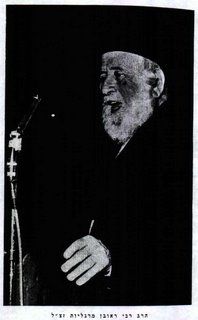R. Reuven Margulies II
 I have already discussed the most recent book of R. Margulies and provided a bibliography of his works, I now want to turn to a brief biography of him.
I have already discussed the most recent book of R. Margulies and provided a bibliography of his works, I now want to turn to a brief biography of him.
R. Margulies was born in 1889 and was known, from the time of his youth, as extremly erudite. Although he recieved ordination, he did not become a Rabbi and instead opened a bookstore in Lemberg. It is said that although his store was always full of talmidi hakhmim it was unclear if he actually sold anything. During his time in Lemberg he began publishing his own books. Many of his early books focus on hassidim. One of his early works, a biography on R. Hayyim ben Attar (Ohr haHayyim haKodesh) included comments by R. Dan Polonski, the author of the Kli Hemdah. In 1935 R. Margulies moved to Israel and became the librarian at the Rambam Library in Tel Aviv.
After moving to Israel he produced some of his most well known works. He began to focus on the Zohar literature and produced a fully annotated version of the Zohar, Zohar Hadash, Tikkunei Zohar and the Bahir. Additionally, during this time, he was involved in a controversy with Gershon Scholem over the R. Jacob Emden/R. Jonathan Eybeshuetz controversy. R. Margulies produced a pamphlet defending R. Eybeshuetz and in response Scholem produced his own disagreeing with R. Marguleis’s conclusions.
R. Margulies also produced an annotated Shulhan Orach, Nefesh Hayiah which he lists, in his typical encyclopedic manner, other books which deal with the same issues. It was this book that some in the comments to a previous post have raised questions about plagerism. The source for this accuasation comes for R. Wolf Leiter. He cites to sixty-one examples from R. Margulies’s book Nefesh Hayiah where R. Leiter notes others have said the same thing prior to R. Margulies. In fact, R. Leiter says these are just the tip of the iceberg. He says “there are hundreds of other examples which I have written on the side of my copy, there is no end I have only provided some examples.” R. Leiter’s examples include citations to articles and other books.
It is important to note, however, that R. Margulies wrote this during World War I. R. Margulies himself notes that this was written during a particular trying time “I remember the long winter nights when I was closed up, alone, lacking everything . . . I wrote and studied from the light of the oven fire, laying upon the floor.” Thus, it is a possiblity that during this time he neglected to look up everything and produced much from memory. In turn, the result may have been to include what he had seen before without attribution.
Additionally, some accuse him of plagerizing from R. Yosef Engel and R. Engel’s comments to the Zohar. I have never seen this in print (aside from the comment).
That being said, to accuse R. Margulies of not being extremely well read and very, very, erudite is wrong. If one looks to R. Yosef HaKohen Schwartz, who himself was one of the biggest bikeim of his day. He corresponded with R. Margulies and among other notes that R. Margulies’s “praises are known to all” that he is “an amazingly sharp mind.” Furhter, if one looks at his bibliography in three parts in the journal Areshet is very apparent R. Margulies’s breath of knowledge. Finally, as evidenced by the bibliography below, R. Margulies produced many, many books and if in one or two he may have been sloppy in attribution it is equally clear that the vast majority of his works he was not.
R. Margulies passed away in 1971.
Sources: Sefer Margolios, ed. Dr. Y. Refael; R. Z.W. Leiter, Tzion l’Nefesh Hayyiah no. 109; R. Y. Schwartz, Ginzei Yosef.


